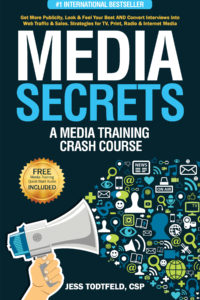Defining your media interview strategy and goals when doing media interviews are imperative to your specific desired outcome(s).
The following is an excerpt from Jess Todtfeld’s new book published by Success In Media, titled Media Secrets: A Media Training Crash Course.

Before you even begin to go out and do media interviews, you need to ask yourself a few very important questions. Answering these questions is critical to your mission. You must “begin with the end in mind,” as Stephen Covey says in The 7 Habits of Highly Effective People. If you don’t know the destination, you’ll never get there.
What is my goal for my upcoming interview(s)? Do you just want to look and sound good or are you hoping the audience will do something. Do you want them to go to a website, buy your book or product? Do you want to make sure they understand your perspective on an event or idea?
What do I need to have happen as a RESULT of the interview? Possible answers include: more sales, more credibility, and/or more web traffic. Looking more comfortable and confident is important, but should not be the end result you are driving towards.
What would the Big Win look like? How do you define Big Win? This last question is one step beyond the results of the interviews. This includes both short and long-term success. Do you want to just look and sound better? Are you looking to get specific messages into your interview? Or, do you want to get more sales or drive more web traffic? All of the above? Write it down. (You can always revise your answer, but writing it down is the first step towards making it happen.)
Know Your Destination
Having a clear sense of where you are heading is critical for this goal-setting process. If you don’t do this, you are destined to mediocre interviews. Mediocre means that, while nothing overtly terrible happened, nothing great happened either. Most people think that media training is about having proper body language or not uttering ums and ahs while giving an interview. While both of those are important, it is also an opportunity to focus on the bigger picture. Use each interview as an opportunity to drive the audience to take action. Just know that you will actualize your goals by having a well-designed roadmap.
One Size Does Not Fit All
If I gave you a set of rules and said that everyone had to play by them, I would be giving you terrible advice. Your goals and outcomes are completely different if you are a/an:
• Corporate Spokesperson
• Author
• CEO
• Celebrity
• Politician
• PR professional
• Expert
• Paid contributor
You must decide which techniques and systems are relevant to you and your situation. Some techniques will be lifesavers to you in interviews. Others will apply to other media situations you may not face. Use the ones that work for where you are in the process. Skip the ones that are not for your situation.
Don’t Over-Complicate
Many books and experts tend to make the idea of “media training” or “media consulting” complicated. However, my job as a media training expert is to constantly try to simplify the process. Your job is the same. Decide what you want as a result of interviews and chart the course. Beginning with the end in mind is the smart way to get the results you are seeking in any interview situation.
You can find these and more helpful strategies in my new media training crash course book!
Get the #1 International Bestselling book “Media Secrets” and all of the current bonus items:
Click to visit: http://www.MediaSecretsBook.com

